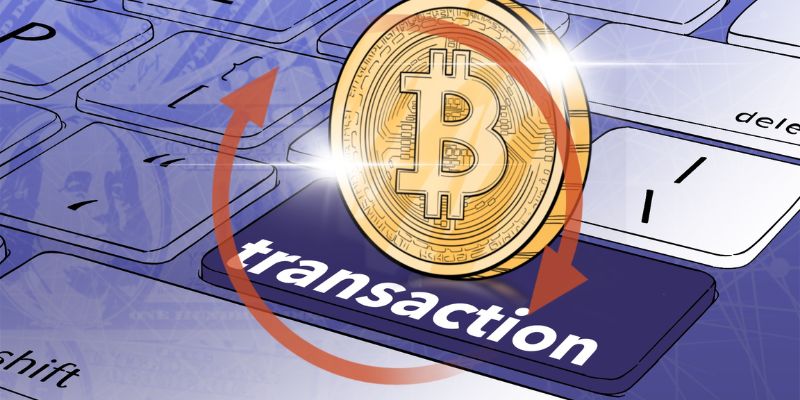Welcome to your foolproof guide on how to make secure crypto transactions. Tired of wading through the wild west of digital currencies without a map? You’re in the right place. The crypto world brims with opportunity but is rife with risks. Here, you’ll unlock the secrets to building a fortress around your digital wealth. From the bedrock of two-factor authentication to the frontiers of smart contracts, get ready. We’re diving into the art of safeguarding your cyber coins like a pro, so you can trade, store, and thrive in the crypto space with confidence. Let’s bulletproof your crypto journey, step by solid step.
Establishing a Strong Foundation for Security
Understanding the Basics of Cryptocurrency Safety Measures
Keeping your crypto safe starts with the basics. First thing’s first: always use a strong password. This is your first guard against theft. Think of it as a sturdy door lock. Use a mix of letters, numbers, and unique characters. It’s key!
Next up: update software regularly. Whether it’s your wallet app or device updates, they stop hackers in their tracks. Software updates fix weak spots that could let thieves in. You wouldn’t leave your house door open, right? It’s just like that.
Now, let’s talk backups. Back up all your important info. If your device fails, this is your safety net. Just make sure to store these backups in a safe spot like a locked drawer or safe.
Implementing Two-Factor Authentication for Your Digital Wallet
Two-factor authentication (2FA) is crucial. It’s like a double lock for your digital cash. Every time you log in, you’ll need two proofs: something you know, like a password, and something you have, like a text with a code.
Most digital wallets offer 2FA. It keeps your coins safer than just a password. It’s like having a secret handshake and a guard who only lets you in if you know it.
To set up 2FA, go to your wallet’s security settings. You might use your phone number or an authenticator app. After entering your password, you’ll get another code to punch in. No code, no entry – simple as that.
When it’s on, thieves can’t get in, even if they guess your password. Always keep your backup codes in a safe place, though. If you lose your phone or can’t get the code, these can save your skin.
In the world of crypto, the smartest move is to stay safe. So set that strong password, keep your software fresh, back up your info, and turn on that 2FA. It’s your money’s best defense.
The Importance of Safe Storage and Transaction Methods
Choosing the Right Hardware Wallet and Cold Storage Solutions
When you get into crypto, think about how to keep it safe. One key step is choosing the right hardware wallet. These wallets are like safe boxes that only you can open. They store your crypto offline, so hackers can’t get to it. This is called cold storage and it’s one of the safest ways to hold your digital cash.
Make sure the hardware wallet you pick supports different kinds of crypto. It should be easy to use, too. A reliable brand with a clear track record is your best bet. One popular option is the Ledger wallet. It keeps your private keys locked away, so even if you’re online, nobody else can touch your coins.
To set up your hardware wallet, follow the instructions carefully. Write down the recovery phrase it gives you and keep it in a safe place. If you lose your wallet, you’ll need this phrase to get your crypto back.
The Role of Encryption and Secure Cryptographic Protocols
Encryption is your secret code that protects your crypto data. It’s like whispering in a noisy room – only the person you’re whispering to can hear you. For crypto, we use secure cryptographic protocols. These are like advanced secret codes that keep your transactions safe.
When you send or get crypto, these protocols scramble the info. This way, only you and the person you’re trading with can understand it. Two-factor authentication (2FA) adds another layer of safety. This means that you have to pass two checks to get into your wallet or account. It could be something you know, like a password, and something you have, like a code on your phone.
By using these methods, you make sure that your crypto is tough for crooks to crack. It’s important to keep learning about safety in crypto. That way, you can stay ahead of new tricks from hackers. Always keep your software updated and watch out for shady websites and emails.
So to keep your digital coins safe, remember these tips. Pick a good hardware wallet for cold storage. Use strong encryption and follow the right steps. And add 2FA to make your security even stronger. With these moves, you’re on your way to making sure your crypto stays in your hands.
Engaging with Crypto Exchanges and Wallets Wisely
Selecting Trusted Crypto Exchange Platforms
When you step into the crypto world, picking a secure exchange is crucial. So, how do you choose a trusted crypto exchange platform? Look for platforms with strong security records, high user praise, and good support. Best practices include checking their security tools and if they follow crypto rules.
These places handle buying, trading, and selling of your digital coins. Just like a traditional bank, they should safeguard your assets with strong tools. This means they use things like encryption for your data so no one else can peek at your info. Two-factor authentication is another shield they should offer. This asks for a second code from you, maybe from your phone, when you sign in or do big trades. It’s like a secret knock that only you know.
Remember, even the secure ones can have hiccups. No place is perfect, but some work hard to keep your crypto safe. Ask around, read reviews, and check their history. It’s like picking a good friend. You want someone reliable when things get tough.
Benefits of Multisignature Wallets and Public and Private Key Management
Now, let’s talk wallets – digital wallets where your crypto lives. You must manage these keys, which are like your crypto’s lock and key. Your public key is like your home address; people need it to send you crypto. Your private key is super secret. It’s the key to your house. Never share it or you could lose your crypto.
Multisignature wallets are like having several locks on your door, and you need many keys to open it. This means multiple people must sign off on big actions. It’s great for groups or extra layers of safety. Think of it as having a group of trusted friends who all need to use their keys to open a shared treasure chest.
With these wallets, you control your keys, not the exchange. So if something bad happens to the exchange, your crypto is still safe with you. But this means you have to be extra careful. If you lose your keys, there’s no “forgot my password” to click.
Take the time to learn about public and private keys. Knowing how they work keeps your crypto safe in your pocket. Secure blockchain transactions rely on them. And remember, using a hardware wallet or cold storage can keep your keys offline. This keeps them away from online thieves.
Staying safe in the crypto world is about smart choices. Choose a stand-up exchange and handle your keys and wallets well. This way, you make the most out of your digital money without worry. Always keep learning and stay sharp. In crypto, knowing is half the battle. The other half is doing the right things to keep your coins secure.
Protecting Your Crypto Transactions End-to-End
Steps to Secure Transaction Verification and Understanding Smart Contracts
To keep your crypto safe, use secure methods to check each deal. It’s like making sure a letter only opens when it reaches the right hands. Use public and private keys for this. Your public key is like your home address, where people can send you crypto. Your private key is a secret password that opens your crypto mailbox. Never share it!
For extra safety, learn about smart contracts. They are like robot helpers that work for you on the blockchain, making deals happen automatically when certain rules are met. They follow strict actions, ensuring deals go as planned without any human error.
Best Practices for Avoiding Phishing Attacks and Enhancing Anti-Money Laundering Protocols
Now, you must learn how to dodge those sneaky phishing attacks. These are tricks that bad folks use to steal your info. Always double-check web addresses and emails. Look for small differences that might make them look fake. It could be a single letter off! Never click on weird links or share your key with strangers.
Also, stick to the law with anti-money laundering (AML) rules. This means only using services that check who you are – this is known as know your customer (KYC). It’s a bit like the checks your bank does. They just want to make sure you’re the good guy!
Remember, using these smart moves will help keep your crypto deals safe from start to end.
In this post, we’ve tackled how to keep your crypto safe. From basic safety steps to smart choices for storing and using your digital cash, we’ve covered it all. We’ve learned that two-factor authentication isn’t just helpful—it’s crucial. Then, we uncovered the best types of hardware wallets and why encryption keeps your coins secure.
We also explored smart ways to pick crypto exchanges and manage your keys. Remember, trusted platforms and multisig wallets are your friends. Finally, we talked about verifying your crypto deals and dodging phishing scams. Each tip we discussed forms a shield to protect your bitcoin, ethereum, or any other digital currency.
Here’s the bottom line: when you deal with cryptocurrency, play it smart. Use the right tools, know the ins and outs, and always stay cautious. You’ve got this!
Q&A :
How can I ensure my cryptocurrency transactions are safe?
To make your cryptocurrency transactions more secure, always use reputable wallets and exchanges with robust security features like two-factor authentication. Keep your private keys confidential and consider using a hardware wallet for an added layer of protection. Always double-check the recipient’s address before confirming a transaction and be wary of phishing attempts by verifying website URLs and email legitimacy.
What are the best practices for safe Bitcoin transactions?
Best practices for safe Bitcoin transactions include using a secure internet connection, enabling all available security features on your wallet, and keeping your software updated. It’s also recommended to use a dedicated hardware wallet for large sums and to transfer smaller amounts to a separate wallet for daily use. Additionally, maintaining regular backups of your wallet can save you from potential data loss.
Can hardware wallets ensure secure cryptocurrency transactions?
Hardware wallets provide one of the highest levels of security for cryptocurrency transactions. They store your private keys offline, making them immune to online hacking attempts. To ensure maximum security, always buy hardware wallets from trusted manufacturers and purchase directly from the official website or authorized retailers.
Why is it important to double-check crypto addresses before sending?
Always double-check cryptocurrency addresses before sending because transactions are irreversible. Once you send crypto to a wrong address, there is no way to retrieve it. Double-checking helps to avoid losses due to human error or clipboard hijacking malware that can replace the intended address with an attacker’s.
What are the risks of using public Wi-Fi for crypto transactions?
Using public Wi-Fi to make crypto transactions exposes you to the risk of interception by malicious actors. These unsecured networks are prime spots for hackers to deploy man-in-the-middle attacks, compromising your sensitive data and potentially gaining access to your crypto assets. For transactions, always use a secure and private internet connection, possibly with a VPN for added encryption.





